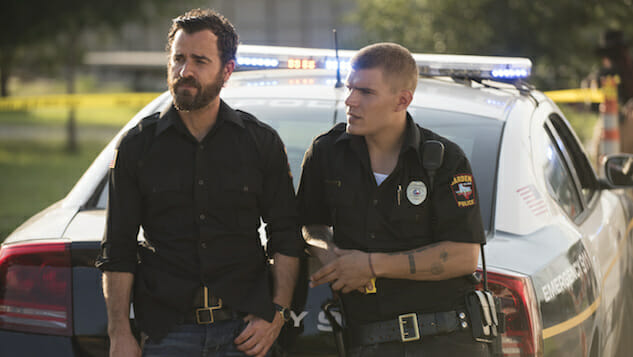The Leftovers‘ Season Premiere Is a Twisted, Terrifying Devotional
(Episode 3.01)
Van Redin/HBO
Three years since the siege of Jarden, Texas, seven since the Sudden Departure, once and future police chief Kevin Garvey (Justin Theroux) surveys the crater where visitors to Miracle National Park once sought passage into Eden. As if to echo the Heroes Day commemoration of The Leftovers’ first episode, reminiscent of the recitation of names each September 11, the gash in the Earth recalls Ground Zero in late 2001, still strewn with rubble: A hole as yet unfilled, made whole, by the work of rebuilding. Inside the city limits, a festival atmosphere reigns—an apocalyptic Haight-Asbury, replete with larger-than-life mockup of Gary Busey and intimations of chaos to come—but here, at the entrance to the series’ third and final season, the air is more solemn, resigned. After all, in Damon Lindelof and Tom Perrotta’s visionary portrait of the world’s near-end, there are forms of destruction that can’t be repaired, absences that remain fixed in space even as we arrange our lives around them.
“The Book of Kevin,” yet another in The Leftovers’ string of extraordinary episodes, is an attempt to chalk the lines of this painful longing, this profound sense of loss; it moves with awful power between the stories with which we salve our wounds and the recognition that there is no satisfying grief, only surviving it. The title, for instance, refers to Matt Jamison’s (Christopher Eccleston) new New Testament, a record of Kevin’s dalliances with death that positions him as a successor to Jesus—one that both enrages and seduces its subject, so unwilling to give up his glimpses of the other side that he asphyxiates himself before work. (The music cue, one of the episode’s most brilliant coups, is Simon & Garfunkel’s “The 59th Street Bridge Song (Feelin’ Groovy)”: “Slow down, you move too fast / You got to make the morning last.”) Kevin is not the only one desperate to cease time’s forward march, or indeed to reverse it. John (Kevin Murphy), whose daughter, Evie (Jasmin Savoy Brown), perished alongside Meg Abbott (Liv Tyler) in the government’s unacknowledged attack on the Guilty Remnant, denies her fate, even in the face of dental records; the entire town is on edge as pilgrims descend for the seventh anniversary of the Sudden Departure, some expecting the kingdom of heaven, others the fires of hell.
As John and his new wife, Laurie (Amy Brenneman), fleece tourists in return for semi-spiritual counsel, or as Matt’s wife, Mary (Janel Moloney) prepares to flee for Mapleton with their young son, Noah, “The Book of Kevin” emphasizes the multitude of avenues by which we seek meaning—per usual, the series’ treatment of faith is “religious” only by religion’s broadest definition, a hermeneutic for explaining the inexplicable phenomena, large and small, that suffuse our experience. The Leftovers, with the global scope of its structuring event, may heighten the drama of this endeavor to existential extremes, but it nonetheless acknowledges that this yearning for patterns, plans, purpose runs through even the most ordinary interaction: Note that Kevin, among the characters most resistant to Matt’s sermons, feels compelled to describe the fender-bender by which he met Laurie and Tom (Chris Zylka) as “divine intervention,” “karma,” “kismet.” Nora (Carrie Coon) clings to procedure, in this case for distinguishing authentic Departures from miscreants’ lies; Dean (Michael Gaston) slips into canine delusions; even Jill (Margaret Qualley), deflecting her fears with a bleakly funny reference to the next revelation, confirms that these competing approaches to understanding the universe are of central importance. “We can’t just be going through all of this for nothing, man,” John remarks at one point, his protestation formed around the germ of despair: If the course of life contains no reason, is it worth living at all?
-

-

-

-

-

-

-

-

-

-

-

-

-

-

-

-

-

-

-

-

-

-

-

-

-

-

-

-

-

-

-

-

-

-

-

-

-

-

-

-








































